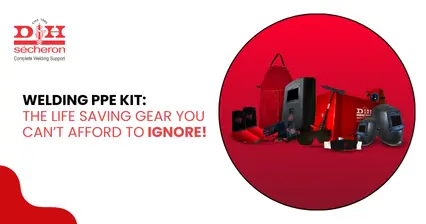The welding filler wires are made from alloys or unalloyed metals. They are used in making a joint through welding, soldering or brazing. When they are melted, they flow into the space between the two fitting parts of the joint. The filler metal is available in several combinations of lead, silver, tin, zinc, copper and aluminium.
Filler is a commonly used welding material in stainless steel electrode. However, there are various types of stainless steel welding options available and you need to be careful about the filler wire that goes into it.
Let’s take a look at the factors you need to consider while selecting filler metal in welding of stainless steel:
1. Base Material to be Welded
You have to find out which filler wire welding will match the best with the base metal. Both chemical and mechanical properties of the filler metal should match with the base metal to make stainless steel welding rod.
2. Welding Position
A flat welding position is the most ideal position. However, welders also need to operate in horizontal, vertical and overhead positions. Choose SS filler wire that offers the most versatility and efficiency in the required welding position.
One of the most popular filler materials is the E308LT1-1 as it provides good strength and can be used in all positions.
3. Welding Process
The choice of filler wire in stainless steel welding also depends on the type of welding method. MIG welding wire material needs consumable filler that can be melted by the arc to produce a quality weld. On the contrary, welding through TIG wire requires manual feeding of the filler into the molten puddle. Hence, it is recommended to use a Tungsten TIG welding wire for reference ER347 filler wire.
4. Dissimilar Metals
When you are creating SS to MS welding rod, you need proper filler. This will help to maintain superior corrosion resistance of the stainless steel and also prevent the hot-cracking defect.
5. Post-Weld Heat Treatment
Post-weld heat treatment is a necessary technique to reduce the residual stress caused by welding and its repair. The filler welding material should be capable of generating welds that can tolerate the application of heat.
Welding Wire Prices
The prices of welding filler rods vary from one manufacturer to another. Make sure that the price is within your budget and offers value for money. You can consider buying filler wires from D&H Sécheron, one of the leading and reliable welding wire manufacturers in India.
11 May 2025 | Welding
An In-Depth Exploration of Low-Alloy Steel: Your Comprehensive Guide
11 May 2025 | Welding
Nagpur - Bori - Tuljapur Road MSH-3 in Yavatmal District (Maharashtra)
11 May 2025 | Welding
Guidelines to Understand Gas Welding: Applications, Advantages & Disadvantages
11 May 2025 | Welding
3 Tips for Finding the Best Mild Steel Electrode for Your Application
11 May 2025 | Welding
Building the Narendra Modi Stadium with Norma V and Autotherme-1 Electrodes
11 May 2025 | Welding
Low Alloy Steel Welding in a (PEB) Pre Engineered Building Structure
11 May 2025 | Welding
Welding Rods: Different Types and Tips for Properly Storing and Handling
11 May 2025 | Welding
Tips for Flawless Welds with Stainless Steel Electrodes: Pros and Cons
11 May 2025 | Welding
Exploring Applications and Benefits of Stainless Steel Welding Electrodes
11 May 2025 | Welding
Welding Basics: Joining Metals with Heat and Pressure - A Beginners Guide
11 May 2025 | Welding
Distinguishing Low-Alloy Steel from High-Alloy Steel: Understanding the Variations
11 May 2025 | Welding
Hard Facing Wire - Understanding the Process and Achieving Optimal Result
11 May 2025 | Welding
Exploring the Advantages of Stainless Steel Electrodes in Welding Applications
11 May 2025 | Welding
Weathering Steel vs. Traditional Steel: A Comparative Analysis of Performance
11 May 2025 | Welding
Choosing the Right Welding Rod: Why 6013 Electrodes Might Be Your Ideal Option
11 May 2025 | Welding
Why 7018 Electrodes Are Preferred for High-Strength Welds in Pipeline Construction
11 May 2025 | Welding
Filler Wire vs. Stainless Steel Filler Wire: Understanding the Key Differences
11 May 2025 | Welding
Exploring the Impact of Filler Material on Welding Quality and Durability
11 May 2025 | Welding
Choosing the Right Cast Iron Electrode for Different Welding Projects
11 May 2025 | Welding
Top Advantages of Cast Iron Electrodes for Industrial Welding Applications
11 May 2025 | Welding
Key Benefits and Challenges of Using TIG Welding in Industrial Projects
11 May 2025 | Welding
5 Reasons Why 7018 Electrode is the Gold Standard for Welding Professionals
11 May 2025 | Welding
Top 5 Advantages of Flux Cored Arc Welding for Heavy-Duty Applications.png)
11 May 2025 | Welding
Lotherme-601: A Game-Changer for Restoring Shoulder Pins in Heavy Machinery
11 May 2025 | Welding
How D&H Sécheron Helped Repair a Rotary Kiln’s Cooler Section with LoTherme 352
11 May 2025 | Welding
Piston Repair for Mining Industry: Cost-Effective Solutions with LoTherme 468.webp)






.jpg)








































.jpg)
.jpg)

.jpg)

.jpg)





.jpg)
.jpg)
.jpg)



.webp)
.jpg)
.jpg)
.webp)
.jpg)






















.png)



.webp)

.webp)
.webp)



